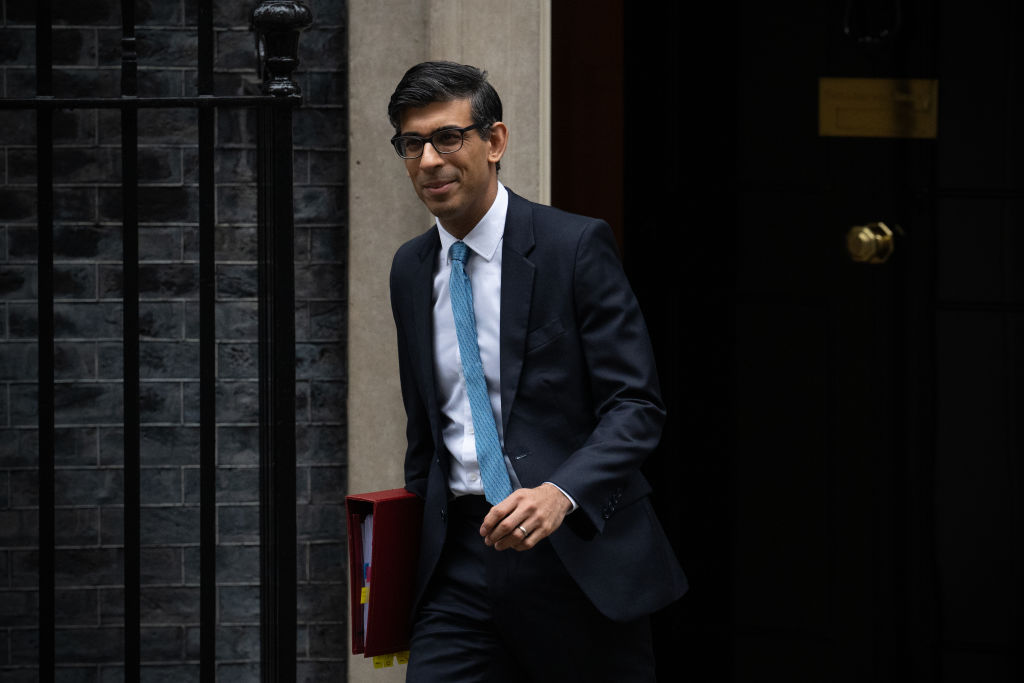The DUP lives rent free in Sunak’s mind and our collective political memory

After Brexit, the Northern Ireland Protocol has created a political headache and financial woes over checks in the Irish sea, but the success of a new deal depends on the DUP, writes Eliot Wilson
“…Except for viewers in Northern Ireland.” For many years, the attitude of British politics to the panjandrums of Belfast has been summed up by the continuity announcer’s familiar phrase: it is different, separate and anyway hard for those on the mainland to understand. Since Brexit, however, Northern Ireland has shouldered its way back on to the news agenda in a way we have not seen since the heady days of the Good Friday Agreement, which will celebrate its quarter-century this year.
Leaving the European Union was always going to be complicated for Northern Ireland, as it is the only part of the UK which shares a land border with an existing member state. The solution to these complexities was the Northern Ireland Protocol, an annex to the Withdrawal Agreement. By placing a de facto customs border down the Irish Sea, the protocol attracted the ire of many in the Unionist community, and Rishi Sunak, since coming to power last year, has been seeking to negotiate a revision of the protocol with the EU.
It is now being briefed that a new deal is close: initially rumours suggested it would be published last week, but according to the latest predictions, it could be done by today. If a “refresh” of the protocol has been negotiated with the European Commission, much will depend on whether it earns the favour of the Democratic Unionist Party. Over the weekend, foreign secretary James Cleverly said the outcome of the deal is “to make sure people, businesses and political representatives of those people in Northern Ireland are comfortable with the resolution”.
That the DUP holds such an important role in delivering a verdict on an international agreement at first seems counterintuitive. The party holds just eight seats at Westminster, and is only the second party in the suspended Northern Ireland Assembly, with 25 of the 90 seats. The government has a healthy majority in the Commons of almost 80, and Keir Starmer has already promised Labour would vote through a revised deal. There are many voices urging the prime minister to simply ignore the DUP.
It is not, however, as easy as that. In bare mathematical terms, the DUP has no leverage. This has not always been the case: when Theresa May gambled on a general election in 2017 and lost her majority, it was the DUP which agreed a confidence-and-supply deal to sustain her in office. Those memories are still vivid in our collective political memory, and many right-wing Conservatives, instinctively wary of the EU and committed to the Union between Great Britain and Northern Ireland, will look to the DUP as a canary in the mineshaft. If the Paisleyites – those followers of the former first minister – endorse a new protocol, it will have passed a certain test, but if they give the thumbs down, Tory rebels may be emboldened to challenge the government.
This is on top of the deadlock in the Northern Ireland Assembly, which has been unable to nominate an executive because the DUP has refused to follow the requisite steps and pick a candidate for speaker of the assembly. The party has pledged to remain obstructionist until the protocol is changed significantly, or better yet, scrapped. The new slate of MLAs elected last May remain, therefore, ready to serve but unable to take their seats.
The urge in Downing Street to face the DUP down must be strong. It won only 21.3 per cent of the vote at the last assembly elections and is a party for which intransigence is familiar territory. There is a respectable intellectual argument that the protocol affects the whole of the UK and its relationship with international organisations, and that therefore any changes should be debated and decided on a UK-wide basis. Theoretically it is a coherent argument, but it ignores the grubby business of politics.
Sunak would be better advised to carry the DUP with him. In Northern Ireland terms, they are the largest Unionist party and, under the current arrangements, it would be impossible to create a functional executive without them, leading to the continuation of direct rule by Whitehall. This will only engender more friction in an already tense devolution set up. Having the DUP’s assent would make life significantly easier for Sunak.
More fundamentally, though, the DUP matters in Northern Ireland. Their distinct trend towards hardline social conservatism and profound distrust of Republicans and Nationalists has limited its voter base to 23 or 24 per cent, but that is still a significant enough faction. For context, UKIP was able to perhaps indelibly change the shape of Westminster politics with just 12.6 per cent of the vote in 2015.
The PM may think he needs to order an especially long spoon, or at least one for his Northern Ireland secretary, Chris Heaton-Harris. But the Tory Party is the body of Conservatives “and Unionists”, and the DUP’s central objection to the protocol, that it divides Northern Ireland from the rest of the UK, has considerable truth and merit. The support of the party would have symbolic importance, but it would also be a diplomatic coup in international terms for a prime minister whose expertise still lies elsewhere.